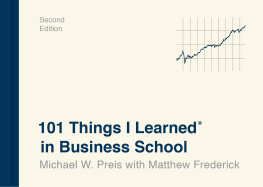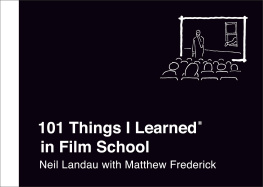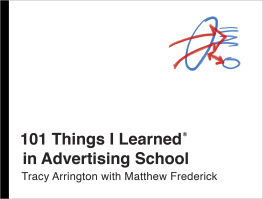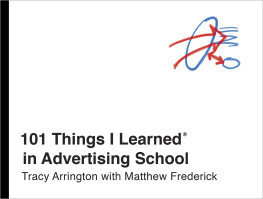Michael W. Preis - 101 Things I Learned in Business School
Here you can read online Michael W. Preis - 101 Things I Learned in Business School full text of the book (entire story) in english for free. Download pdf and epub, get meaning, cover and reviews about this ebook. year: 2021, publisher: Crown, genre: Business. Description of the work, (preface) as well as reviews are available. Best literature library LitArk.com created for fans of good reading and offers a wide selection of genres:
Romance novel
Science fiction
Adventure
Detective
Science
History
Home and family
Prose
Art
Politics
Computer
Non-fiction
Religion
Business
Children
Humor
Choose a favorite category and find really read worthwhile books. Enjoy immersion in the world of imagination, feel the emotions of the characters or learn something new for yourself, make an fascinating discovery.
- Book:101 Things I Learned in Business School
- Author:
- Publisher:Crown
- Genre:
- Year:2021
- Rating:4 / 5
- Favourites:Add to favourites
- Your mark:
- 80
- 1
- 2
- 3
- 4
- 5
101 Things I Learned in Business School: summary, description and annotation
We offer to read an annotation, description, summary or preface (depends on what the author of the book "101 Things I Learned in Business School" wrote himself). If you haven't found the necessary information about the book — write in the comments, we will try to find it.
101 Things I Learned in Business School — read online for free the complete book (whole text) full work
Below is the text of the book, divided by pages. System saving the place of the last page read, allows you to conveniently read the book "101 Things I Learned in Business School" online for free, without having to search again every time where you left off. Put a bookmark, and you can go to the page where you finished reading at any time.
Font size:
Interval:
Bookmark:
Acknowledgments
From Michael
Thanks to Sal Divita, Geoff Love, Kevin Waspi, Kevin Jackson, Joe Mahoney, Greg Kellar, Abbie Griffin, and Bill Brooks.
From Matt
Thanks to Tracy Arrington, Alissa Barron, David Blaisdell, Dick Canada, Paul Caulfield, Sorche Fairbank, Mary Helen Gillespie, Sung Jang, Jim Monagle, Roni Noland, and Sandy Parin.
Other books in the 101 Things I Learned series
101 Things I Learned in Advertising School
101 Things I Learned in Architecture School (MIT Press)
101 Things I Learned in Culinary School, Second Edition
101 Things I Learned in Engineering School
101 Things I Learned in Fashion School
101 Things I Learned in Film School
101 Things I Learned in Law School
101 Things I Learned in Product Design School
101 Things I Learned in Urban Design School
Authors Note
An MBA is one of the most sought-after postgraduate degrees, viewed by many as a reliable avenue to a good job and lucrative career. However, while an MBA can help jump-start ones career and may speed professional advancement, it isnt the most essential factor for long-term success.
As often happens, when the majority of people figure out the rules of the game, the game changes. The paradigm of spending an entire career with a single employer or within a single industry is far less common than it once was. Those starting their careers now are likely to work for multiple employers and even in multiple industries over the course of their working lives. Thus, being able to learn quickly, adapt to change, and employ ethical behavior, passion, and savvy thinking in the face of new challenges is crucial.
Business school provides specific information, skills, and tools for tomorrows businesspeople, but more importantly it instills a desire and proficiency for learning beyond the classroom. Further, there is no single discipline called business; it is, rather, a broad field of endeavor encompassing such diverse areas as accounting, communications, economics, finance, leadership, management, marketing, operations, psychology, sociology, and strategy. Those who confine their learning to one of these areas may limit their potential for advancement. Those most likely to be successful in business in the long run will be those with the broadest and most open understanding of it.
This book presents lessons in business that will be most useful to you, whether you are a student, experienced businessperson, beginning entrepreneur, or someone with a casual interest in the field. It may be many years before you have the opportunity to apply some of these lessons, but it is my hope that they will increase your understanding and help you navigate the interesting and challenging world of business.
Michael W. Preis
Michael W. Preis has been a management consultant, business owner, executive, and clinical professor of business administration at the University of Illinois at Urbana-Champaign. He holds a BS in mechanical engineering from The Ohio State University, an MBA from Harvard Business School, and a PhD in marketing from George Washington University.
Matthew Frederick is a business owner, bestselling author, instructor of design and writing, and the creator of the 101 Things I Learned series. He lives in New Yorks Hudson Valley.
101ThingsILearned.com
Business is the exchange of values.
In a business transaction, each transactor assigns a higher value to what it receives than what it provides. A customer who buys a sweater for $50 values the sweater more than the $50, while the seller values the $50 more than the sweater.
The value of an item is thus not purely material or monetary, but may be emotional in nature. A value may also be anticipatory: one might overpay for an ice cream machine, for example, because of an expectation that it will generate future income. In this sense, business is sometimes defined as the exchange of current value for future value.

Business is a field of multiple endeavors.
Accounting: the language of business, which organizes and conveys information about transactions in monetary terms.
Finance: the management of money and monetary assets.
Marketing: the systematic identification of and response to customer needs and wants, including the coordination of branding, promotion, distribution, and delivery.
Production and operations: the coordination and overseeing of activities such as manufacturing and provision of services.
Organizational behavior: the study of how people act and interact in work settings; may include motivational strategies, corporate organization and culture, leadership models, group psychology, and conflict resolution.
Economics: a broad social science concerned with the production, distribution, and consumption of goods, services, and financial resources.

Private businesses seek profit. Government-owned businesses seek universality.
Private, for-profit businesses are formed to earn money for their owners.
Not-for-profit organizations are created by private individuals and organizations to promote social causes, such as feeding the poor, operating museums, or teaching job skills. Monies gained through such activities must further the organizations cause, not be returned to its owners.
Government-owned businesses exist to serve universal interests. For example, it is of universal interest to have safe water; thus, a government entity might operate a water and sewer utility.
Some government businesses began as private sector businesses. Fire departments were once private businesses serving paying subscribers. But because a burning unsubscribed building threatened subscribed buildings, fire protection became recognized as a universal interest.
A common alternative to a government-run enterprise is a regulated monopoly, such as an electric, telephone, or gas utility. The government controls pricing and usually requires universal serviceeven to unprofitable areas.

Business ownership
Sole proprietorship: An unincorporated business owned by a single individual. The owner and the business are legally the same entity, although a separate business name may be used. It is the simplest form of ownership, and the owner is personally liable for all acts and debts of the company. Income is reported on Schedule C of the owners personal tax return.
Partnership: The same as a sole proprietorship but with multiple owners. Partners ownership interests need not be equal, but any partner may be liable for acts of the others. Liability is not proportional to ownership interest.
Limited liability company: A hybrid type of ownership that combines some of the simplicity and tax flexibility of sole proprietorships and partnerships with the personal liability advantages of corporations.
Corporation: A business entity that is legally distinct from its owners, who cannot be held personally liable for its acts or debts. The owners are stockholders. Stock may be privately held (e.g., a family business) or publicly traded on a stock exchange . C corporations pay taxes based on net profit, while S corporations pass some income and losses to the owners for inclusion on their personal tax returns.
Font size:
Interval:
Bookmark:
Similar books «101 Things I Learned in Business School»
Look at similar books to 101 Things I Learned in Business School. We have selected literature similar in name and meaning in the hope of providing readers with more options to find new, interesting, not yet read works.
Discussion, reviews of the book 101 Things I Learned in Business School and just readers' own opinions. Leave your comments, write what you think about the work, its meaning or the main characters. Specify what exactly you liked and what you didn't like, and why you think so.










